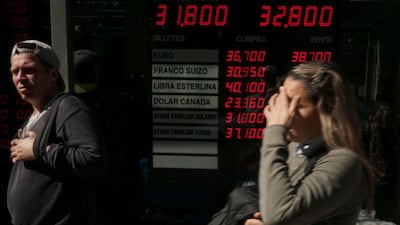Argentina’s president Mauricio Macri said on Wednesday that the International Monetary Fund (IMF) agreed to accelerate funding in support of his government’s austerity programme.
However, the announcement did not calm the market as the country’s currency came under renewed pressure.
IMF chief Christine Lagarde said the Washington-based lender would look at speeding up payments of the bank’s US$50 billion (Dh184bn) loan after talks with Mr Macri on Wednesday.
The IMF approved the $50bn, three-year standby loan in June.
Ms Lagarde said the IMF would work to strengthen its arrangement with Argentina and “re-examine the phasing of the financial programme”.
_______________
Read more:
Risk of escalating emerging market pressure looms
_______________
The “more adverse international market conditions” battering Argentina’s economy “had not been fully anticipated,” she said.
Mr Macri called for the early release of the funds in a phone call with Ms Lagarde on Wednesday.
It came amid heightened volatility in Argentina’s financial and currency markets, which have been battered by uncertainty over inflation, an economic downturn and budget deficits.
The Argentine peso has lost more than 40 per cent of its value against the dollar this year. Inflation is projected to surpass 30 per cent by the end of 2018.
And the peso continued its decline on Wednesday, plummeting 6.99 per cent through the day to fall to 34.48 to the dollar by the close.
Mr Macri had sought to soothe the turbulence in a statement before markets opened, assuring Argentines that help was on the way.
“Over the past week, we have had new expressions of lack of confidence in the markets, especially over our ability to obtain financing for 2019,” Mr Macri said.
He said the IMF would provide “all the funds necessary to guarantee the fulfilment of the financial programme next year”.
In return for an accelerated loan payment, the government has committed to reducing its budget deficit to 2.7 per cent this year, from 3.9 per cent in 2017, and to 1.3 per cent of GDP next year.
Doubts over Argentina’s ability to repay heavy government borrowing have grown and analysts said the move reflected growing desperation in Mr Macri’s centre-right government.
“The announcement was vague and was made by the president, which has its risks,” said analyst Lorenzo Sigaut, of consultants Ecolatina, who said it would have been more convincing if the announcement had been made by the economy minister.
Overall doubts of an Argentine default on borrowings had been assuaged “only until Macri’s term ends (in December next year) but as of 2020, they remain latent”.
“The dollarisation of assets is fuelled internally by Argentines’ distrust of the peso, because the government has promised much on the economy but hasn’t delivered,” said Mr Sigaut.
Part of the $50bn loan is to be allocated to support the budget, and the rest to the country’s central bank to shore up the peso over a three-year period.
The first $15bn tranche has already been released.
Economist Matias Carugati said there was a lack of information coming from the government to calm the markets.
“We know that the IMF is advancing money to cover us next year, but how much will they advance us and under what conditions?” he asked.
He maintained however that “the risk of a default is exaggerated”.
“Argentina does not have a solvency problem, but more a short-term liquidity issue. It’s urgent to achieve financial calm and then see how to repair the damage.”
The economy contracted 6.7 per cent in June, the third month in a row of negative growth, and the annual growth rate was a negative 0.6 per cent.

